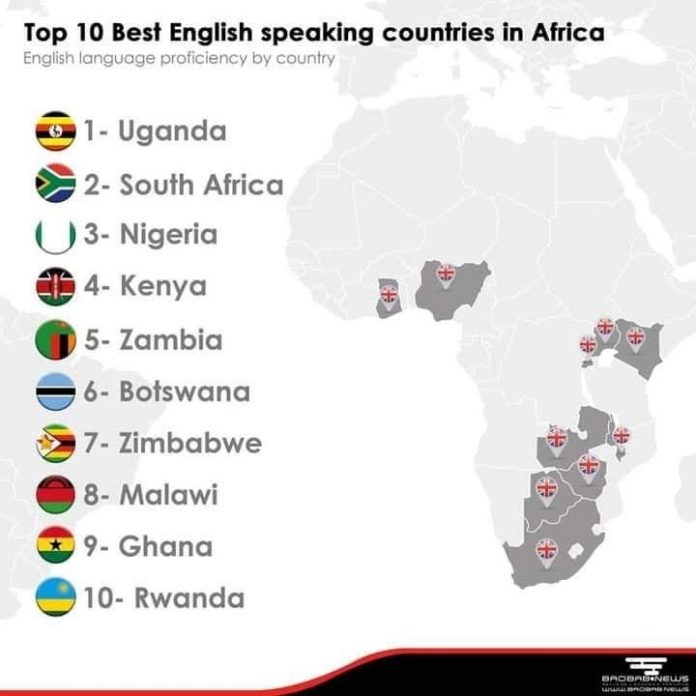Uganda boasts as the best English Speaking country in Africa based on the survey to describe English proficiency by country. It is no surprise that English is widely spoken in Uganda here is why;
There is the Universal Primary Education (UPE) scheme which was introduced by the government in 1997 with the major aim of improving the literacy rates of the entire population of the country. This initiative has been on going ever since that period and it continues to play a major role in helping the underprivileged as well as poverty stricken homes with access to primary education at the grass root levels.
The government later introduced Universal Secondary Education (USE) with a motive of providing free secondary school education to the entire population of the country having already attained free primary education. This drive started in the country immediately after the 2001 presidential elections.
Since time memorial, the government has been awarding scholarships for exceptional students at the public universities and other tertiary institution to attain education for awards of diplomas and university degrees. These bursaries are based on academic performances and later they introduced the quota system where students from perceived less developed districts are given a chance to attain these bursaries since those districts do not have capacity in terms of amenities at their schools to compete with schools from the more developed districts of the country.
So you might be wondering how this free access to education for all helps in any way to contribute to the country being ranked as the first in English language proficiency. Well, your answer is; English is the only form of administration at schools. All subjects taught right from kindergarten are administered in English.
At primary level, the child goes through school for a period of 7 years studying a class in each year that is from Primary one to Primary seven and at the end of the seven years, they sit for the national Primary Leaving Examinations (PLE). There are basically 4 subjects examined after the 7 years which include; English, Mathematics, Science and Social Studies. English and Mathematics are always a core in the progress of a child to other levels. Each subject is graded based on a scale of 1-9, with 1 and 2 as distinctions; 3, 4, 5, and 6 are credits; 7 and 8 are passes, while a 9 is a failure.
Heading into secondary school, this is studied for a period of 6 years however, the 6 years are divided into two categories; Ordinary Level which is studies for a period of 4 years, and Advanced Level which is studied for a period of 2 years.
At Ordinary level, the grading is based on the best 8 subjects done. At Ordinary Level, the subjects can be categorized in 4 areas as below;
Mathematics and Science; subjects taught – Mathematics, Biology, Chemistry, Physics, Physical Education, General Science – all these subjects are compulsory except General Science.
Social Sciences; subjects taught – Geography, History, and Religious Education – all subjects are compulsory except Religious Education
Languages; subjects taught – English Language, Kiswahili, Literature in English, Local Languages (Luganda, Lusoga, Runyakitara) and Foreign Languages (French, German, Spanish) – only English is compulsory
Vocational Subjects; subjects taught – Commerce, Fine Art, Music, Agriculture, Home Economics, Wood Work, Metal Work, Technical Drawing, Entrepreneurship Education , Computer Studies – all these are optional and a student can choose not to take any of them at the national Uganda Certificate of Education exams conducted after the 4 years.
Depending on the school you choose to attend, the subjects taught at a particular school depends on the school’s capacity to get the teachers to teach those particular classes.
During the 4 years at Ordinary Level, the student is supposed to study all the subjects taught at the school for the first two years and in the third year, they drop off some subjects that they feel will not be done better after their fourth year bearing in mind the compulsory subjects to be done.
At O level, each subject is graded based on a scale of 1-9, with 1 and 2 as distinctions; 3, 4, 5, and 6 are credits; 7 and 8 are passes, while a 9 is a failure.
At Advanced level, the subjects taught include; Sciences (Mathematics, Physics, Biology, Chemistry) Arts (Economics, Geography, Entrepreneurship, Christian Religious Education, Islam Religious Education, History, Fine Art) then, Sub Mathematics, Sub Computer Studies. Note that; General paper and either of computer studies or sub mathematics are compulsory for A level.
At A level, each subject is graded as follows, an A carries 6 points, B – 5 points, C – 4 points, D – 3 points, E (principal pass) – 2 points, O – 1 point and F – 0 point. General paper and either of computer studies or sub mathematics all require a credit to be passed and carry 1 point if passed. In order to be admitted to any public university, you must have a grade of E or better.
At tertiary education level, a course to be studied determines the number of years you spend in school. Most diploma courses take a period of 2 years and degree courses take a period of 3 years. Note that a principal pass while joining a tertiary institution is mandatory while other courses require when you have passed General paper.
Based on the above, all the subjects and courses are administered with the English language as the only form of administration. So why would Uganda not be the best speaker of this language which was introduced by the British colonialists.
Some people attribute the literacy level in Uganda to the existence of the many dialects which are somewhat not related hence, the English language being the major form of easy communication among the people from different settings. English has always been the only official language in Uganda and it is the language used in the Parliaments. With this fact, the minimum requirement for any Member of Parliament is a certificate to show proof of completing A level.
For anyone coming on a Tour to Uganda from an English speaking background, be rest assured that you will have limited language barrier since most of the people have knowledge of the English language,






